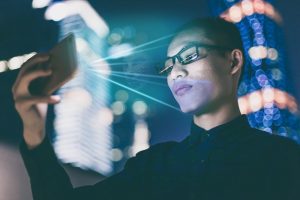
(Image via Getty)
There’s a lot out there about the racist history of facial recognition algorithms. Academics have noted that the technology rests on systemic racist assumptions, a 2019 government study confirmed it, and states are looking into banning it. But for thousands of soon-to-be attorneys across the United States, this technology will decide whether or not they’re cheating on their bar exams in a couple weeks. What can possibly go wrong?
This applicant isn’t alone. A California applicant also recently posted the same problem:

This isn’t a new problem. Victoria Hudgins covered this back in August when we were dealing with Michigan’s effort to deploy this technology and detailed the absurd and inexcusable additional burden this is placing on non-white applicants:
Taylor, who is Black, has readjusted her studying tactics to prepare to be observed by ExamSoft’s facial recognition tech.
“It’s going to affect my preparation for the bar. I will be far more conscious of my face as I study,” she said. She’s practicing for her exam under different conditions, such as foregoing glasses for contacts, practicing under perfect lighting and other scenarios.
“I don’t want to be flagged for cheating, and I would want to prepare properly,” she added.
But in the intervening month and a half, the software hasn’t gotten much better. Probably because they’re still trying to figure out if they can make desktop computers work.
When I spoke with diploma privilege advocates earlier this summer, we discussed the possibility that the ExamSoft system may violate California city ordinances banning the use of the technology for a number of applications. But even if those specific ordinances don’t apply, there’s ample cause for state and local officials to get involved when we have a state-sponsored entrance exam discriminating against people on the basis of race. I think there’s, like, an Amendment about that or something.
The ILG online exam experience was… not good. But the appeal of the ILG model was the commitment to live proctoring. Actual human beings would be watching over the test takers in the same way they would at an in-person location. By contrast, ExamSoft uses an algorithm to watch everyone which alleviates the technical hurdle of simultaneously routing thousands of feeds to remote proctors, but introduces all the rest of the racist baggage from facial recognition tech.
It also can’t deal with diabetics, but that’s another article.
There will be a day when facial recognition technology is useful and reliable, but it’s gotten way out ahead of itself. This is the stage where facial recognition developers should be futzing around with whether or not you need a password to update Candy Crush, not forming the basis of no-knock warrants. And somewhere in between those applications is “gatekeeping the legal profession” but it’s a lot further from the former than it needs to be.
Earlier: Bar Exams’ Facial Recognition Deployment Is Heightening Test Takers’ Anxiety
 Joe Patrice is a senior editor at Above the Law and co-host of Thinking Like A Lawyer. Feel free to email any tips, questions, or comments. Follow him on Twitter if you’re interested in law, politics, and a healthy dose of college sports news. Joe also serves as a Managing Director at RPN Executive Search.
Joe Patrice is a senior editor at Above the Law and co-host of Thinking Like A Lawyer. Feel free to email any tips, questions, or comments. Follow him on Twitter if you’re interested in law, politics, and a healthy dose of college sports news. Joe also serves as a Managing Director at RPN Executive Search.




